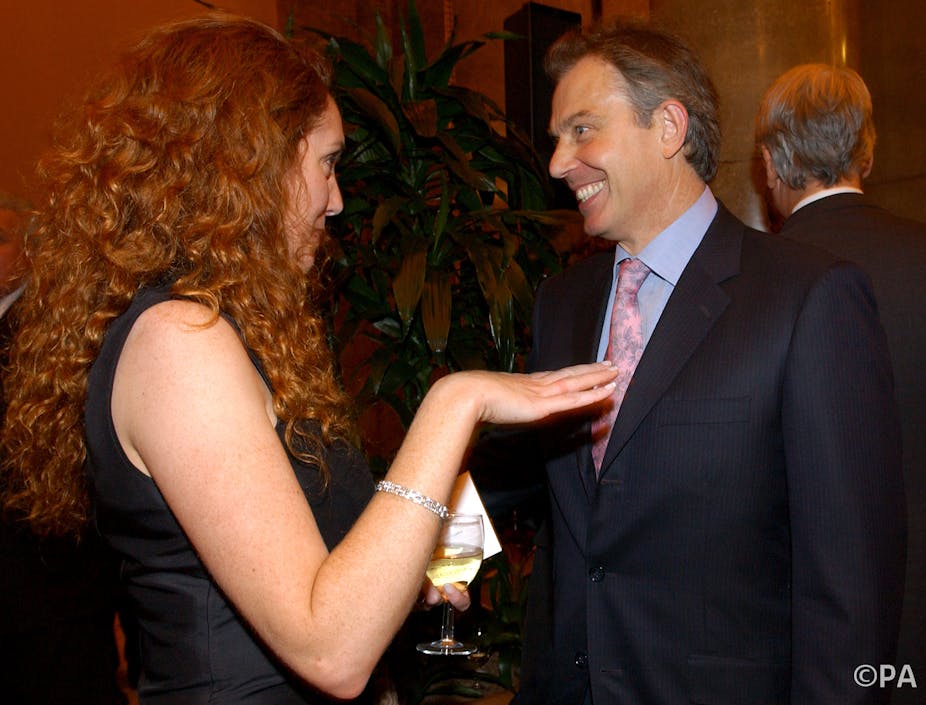The paradox inherent in the recent revelations that Tony Blair offered help and advice to former News International chief executive Rebekah Brooks in her hour of need is that it comes as no great surprise when, given the circumstances at the time, it is actually quite surprising.
Brooks, along with fellow former Murdoch editor (and former Cameron mouthpiece) Andy Coulson and two others face charges in connection with unauthorised access to phone messages. They all plead not guilty to all charges.
This week the court heard that, at the height of the phone-hacking scandal, Blair held an hour-long telephone conversation with Brooks, during which he gave advice on how to get through the crisis and offered to act as a confidential adviser to her, Murdoch and his father Rupert. This conversation was summarised in an email sent by Brooks to her boss after the call.

It is no great surprise that Blair may have offered Brooks his support because first, he probably felt that on a political level he “owed” the Murdochs and their clan. Not only had they, and their newspapers (The Sun in particular) backed him through three successful election campaigns but they had pulled the rug from under the feet of his successor, Gordon Brown, by switching their support to the Conservatives in the run-up to the general election in 2010.
One would expect most political leaders to be saddened when press allies desert their successor but the relationship between Blair and Brown, once very close, had, to say the least, cooled. And although Blair was far too canny to have made anything other than supportive noises during Brown’s attempts to stay in power, it is not unimaginable that news of the defection of The Sun would have been greeted by the odd wry smile and the occasional chink of a wine glass between Blair and his wife Cherie.

The second reason why the call was no great surprise was because on a personal level Blair was extremely close to the Murdochs and to Rebekah Brooks. He was godfather to Grace, one of Murdoch’s children with his (now former) wife Wendi Deng and had been a guest at Brooks’ wedding. It has also been alleged that he had a very close relationship with Deng, which has been the subject of much subsequent press speculation, very much in the tradition of the “Screws”.
The third reason is perhaps the most chilling for the lack of surprise. In his reported phone conversation the court heard that Blair suggested that a “Hutton-style report” might help. This was not explained in court, but it would appear to be a reference to Lord Hutton’s investigation into the death of government scientist David Kelly, the implication being that allegations of phone hacking could be dealt with in the same way as Weapons of Mass Destruction (or lack of them) in Iraq.
Labour pains
On the other side of the argument – reasons why Blair’s initiative was, in fact, surprising – is first because he apparently made the offer at the same time that the then (and now) leader of the Labour Party, Ed Miliband, was calling for the launch of a full-scale public inquiry into the phone hacking scandal. Miliband’s call led to the Leveson Inquiry – and it was a massively popular stand with the general public (if not with the press). Odd then that one of Miliband’s predecessors should allegedly choose that particular moment to offer ongoing support and advice to the beleaguered Murdoch team.
Odd also, if it is the case, that Blair regarded himself as something of an expert in handling crisis media relations, given the ongoing stain that the invasion of Iraq has left on his public reputation, a stain that not only lingers but shows no signs of diminishing.

At the time of the publication of the Hutton Report, with the exception of the then culture secretary, Tessa Jowell, there appears to have been a total failure by Blair and his advisers to realise that, in the light of the what appeared a whitewash by the Hutton Inquiry, a period of humility and bridge-building might have been the most appropriate response.
Instead they waged a triumphalist campaign with the apparent aim of further humiliating the BBC but that instead led to a significant rise in the BBC’s public approval ratings – hardly a master class in crisis communications.
Blair’s pressing concerns
But perhaps the most surprising reason why Blair might have made such an offer of help is because, in one of his final public utterances as prime minister he had launched a mighty onslaught against what he saw as the disgraceful standards and behaviour of the British press which he described as “feral beasts”.
So it would be surprising, to say the least, if a man who regarded the investigative journalism of the Independent¸ as “feral” had no problems in offering assistance to the editors and publishers of a newspaper where the behaviour of some journalists was so heinous that it was closed down just days after Blair made his offer.
The case continues.

